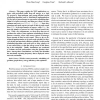Free Online Productivity Tools
i2Speak
i2Symbol
i2OCR
iTex2Img
iWeb2Print
iWeb2Shot
i2Type
iPdf2Split
iPdf2Merge
i2Bopomofo
i2Arabic
i2Style
i2Image
i2PDF
iLatex2Rtf
Sci2ools
PAAPP
2007
2007
Time-optimum packet scheduling for many-to-one routing in wireless sensor networks
Abstract— This paper studies the WSN application scenario with periodical traffic from all sensors to a sink. We present a time-optimum and energy-efficient packet scheduling algorithm and its distributed implementation. We first give a general many-to-one packet scheduling algorithm for wireless networks, and then prove that it is timeoptimum and costs max(2N(u1) − 1, N(u0) − 1) time slots, assuming each node reports one unit of data in each round. Here N(u0) is the total number of sensors, while N(u1) denotes the number of sensors in a sink’s largest branch subtree. With a few adjustments, we then show that our algorithm also achieves time-optimum scheduling in heterogeneous scenarios, where each sensor reports a heterogeneous amount of data in each round. Then we give a distributed implementation to let each node calculate its dutycycle locally and maximize efficiency globally. In this packet scheduling algorithm, each node goes to sleep whenever it is not transceiving, ...
| Added | 27 Dec 2010 |
| Updated | 27 Dec 2010 |
| Type | Journal |
| Year | 2007 |
| Where | PAAPP |
| Authors | Wen-Zhan Song, Fenghua Yuan, Richard LaHusen, Behrooz Shirazi |
Comments (0)

